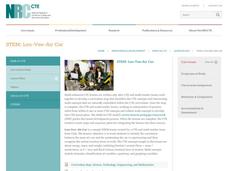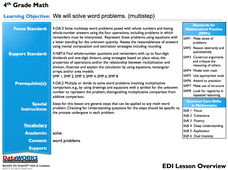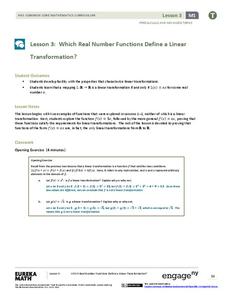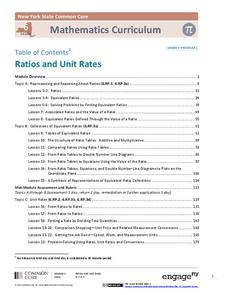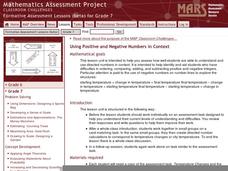The New York Times
Fiction or Nonfiction? Considering the Common Core's Emphasis on Informational Text
Nothing aids in comprehension more than an explanation and understanding of why things are done. Address why the Common Core requires the reading percentages that it established and analyze how this affects your readers. Learners read...
National Research Center for Career and Technical Education
STEM: Lou-Vee Air Car
A comprehensive activity on acceleration awaits your physicists and engineers! Two YouTube videos pique their interest, then sample F=ma problems are worked and graphed. The highlight of the activity is the building of a Lou-Vee air car!...
NYSU
Understand a Fraction as a Number on a Number Line
Piece by piece young scholars build a basic understanding of fractions in a Common Core-designed elementary math lesson. Through a series of hands-on activities and journaling exercises, and with the help of multiple...
Federal Reserve Bank
Your Budget Plan
What do Whoosh and Jet Stream have in common? They are both characters in a fantastic game designed to help students identify various positive and negative spending behaviors. Through an engaging activity, worksheets, and...
DataWorks
4th Grade Math: Multi-Step Word Problems
Solving word problems requires reading comprehension and math computation. Through an interactive slideshow presentation, fourth graders observe and follow each step toward solve multiplication and division word problems.
EngageNY
Interpreting Division of a Fraction by a Whole Number—Visual Models
Divide fractions just like a model does. Pupils visualize the division of a fraction by a whole number by creating models. Scholars make the connection between dividing by a whole number and multiplication before practicing the skill...
EngageNY
Interpreting Division of a Whole Number by a Fraction—Visual Models
Connect division with multiplication through the use of models. Groups solve problems involving the division of a whole number by a fraction using models. The groups share their methods along with the corresponding division and...
Yummy Math
Steep Hikes
Grab your hiking gear and get ready for a math adventure! Learners explore the meaning of percent grade change, as compared to the slope in an excellent worksheet activity about hiking trails in the mountains of New Hampshire. They...
EngageNY
The Euclidean Algorithm as an Application of the Long Division Algorithm
Individuals learn to apply the Euclidean algorithm to find the greatest common factor of two numbers. Additionally, the lesson connects greatest common factor to the largest square that can be drawn in a rectangle.
Illustrative Mathematics
Counting Squares
Challenge young mathematicians' understanding of squares with this geometry puzzle. The task is simple, identify as many squares as possible in a 3x3 array. Allow learners to work independently or in pairs as they search for squares,...
Federal Reserve Bank
Financial Fables: Shopping Wisely with Olivia Owl
Cover two subjects with one lesson! First, dive into English language arts; read an eBook, answer comprehension questions, and complete a cause and effect chart about the financial fable, Shopping Wisely with Olivia Owl. Then, take...
California Department of Education
I Have “M.I.” Strengths!
There are so many ways to be smart! Can your class identify their intelligences? The third of five career and college lesson plans designed for sixth graders challenges them to assess their unique skills. Once they determine their...
EngageNY
Some Facts About Graphs of Linear Equations in Two Variables
Develop another way to find the equation of a line. The lesson introduces the procedure to find the equation of a line given two points on the line. Pupils determine the two points from the graph of the line.
EngageNY
Solving Problems by Finding Equivalent Ratios
Combine total quantities and equivalent ratios in problem solving. The fifth lesson in a series of 29 presents problems that can be solved using equivalent ratios. Pupils use part-to-part ratios and either sums or differences of the...
EngageNY
Which Real Number Functions Define a Linear Transformation?
Not all linear functions are linear transformations, only those that go through the origin. The third lesson in the 32-part unit proves that linear transformations are of the form f(x) = ax. The lesson plan takes another look at examples...
EngageNY
An Appearance of Complex Numbers 1
Complex solutions are not always simple to find. In the fourth lesson of the unit, the class extends their understanding of complex numbers in order to solve and check the solutions to a rational equation presented in the first lesson....
Mathalicious
XBOX Xpotential
Touchdown! This is an exponentially insightful lesson that explores the growth of football games with different video game consoles. Class members discuss whether the increase of mergahertz can be described as linear or exponential....
EngageNY
Ratios and Unit Rates
This turn-key unit on ratios and unit rates walks through a 30-lesson unit on teaching proportional reasoning, with each lesson broken into detailed teaching notes and time allotments for all parts. An unbelievable resource when taken...
Federal Reserve Bank
So How Much Are You Really Paying for that Loan?
Loans are rarely provided without a cost. Pupils evaluate the high cost of using a payday loan or payday advance through discussion and worksheets, and finally work in groups to develop short public service announcements...
Mathalicious
Domino Effect
Carryout the lesson to determine the cost of pizza toppings from a Domino's Pizza® website while creating a linear model. Learners look through real data—and even create their own pizza—to determine the cost of each topping. They...
Mathematics Assessment Project
Using Positive and Negative Numbers in Context
Measure the temperature of your math class with a temperature-based lesson on adding and subtracting rational numbers. The thermometer serves as a vertical number line for learners as they work together to solve a temperature change...
Federal Reserve Bank
Lesson 4: Back to School
Based on your current level of human capital, how long would it take you to earn $1,000,000? What about your potential human capital? Learners explore the importance of education and experience when entering the workforce, and compare...
The Digits
Telling Time: The Digits
Time to teach your students how to read a clock? This resource is here to help! Engaging young mathematicians with two fun videos and a series of hands-on activities, these lessons offer a multimedia approach to teaching this important...
EngageNY
Complex Numbers and Transformations
Your learners combine their knowledge of real and imaginary numbers and matrices in an activity containing thirty lessons, two assessments (mid-module and end module), and their corresponding rubrics. Centered on complex numbers and...

